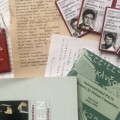What myths did this recent Artsakh War destroy for you as a writer?
I have to confess that until this war (even if to a small extent) I was very comfortable within an ethnopistic vision; I thought that our “undefeated” army would have the spirit and preparedness necessary to ensure the favorable outcome of any war. Naturally, as a past (and future) ethnopist, I had not considered the real scale of imbalance between the military resources of both sides, and the first myth that had shattered once and for all on September 28 itself was that one could secure victory through belief in invincibility or strength of spirit alone. Then, the next myth destroyed was that one should not write or speak about the army, or should act with extreme delicateness and responsibility when doing so. This is like putting on clean clothes when your body is dirty. It is a major deceit which we paid for, and rightly so. The third myth was about collective memory or collective wisdom. Interestingly, for more than twenty years, we have been fed these myths and in just a few hours we discovered that this was not the truth, that history can repeat itself in exactly the same way one hundred years later, and you understand that there is no such thing as the past or the present. There is only you, the ruler of all times (Seneca). And so, frivolousness and naivete (the world will come to our aid, because we are the good guys), not to mention outright foolishness (the world owes us for the Genocide and we were the first state to accept Christianity, and Narekatsi was one of our own), cast their roots deep. They are not easy to exterminate.
What thoughts were born as a result of the Second Artsakh War and the defeat we suffered?
Naturally, the first thing is the gravity of the situation. During the COVID pandemic, it became an everyday habit to check our phone screens to see how many people had died on that day, but this reached levels of absurdity during the war. It is difficult to acknowledge that you have woken up to another day and you’re still alive, while others that were much younger than you would not be waking up that morning. Tens of them, hundreds. Whenever I asked what we can do, everyone was silent. In any case, the only way to overcome death is to live (and to become a better person). Separate from everyone’s sense of “unity”, isolated from the crowd. Since November, I have been constantly thinking about one of my friends who never returned. I talk to him in my mind and the greater the number of topics we discuss and the more open the conversation becomes, the more I am disgusted by what I see. But there were many others like Areg, they were all supposed to come back. But the stage was occupied by liars. I am now convinced of the need to isolate myself and to trust only a small group of people. There are other things on my mind as well, but this is not the time to discuss them.
As a writer and an intellectual, how do you see your own mission when it comes to fostering reconciliation between these peoples and the establishment of good relations with neighbors?
Through a battle against populism and ethnopism (but the first thing to explain is, of course, that good relations with neighbors does not mean that you throw yourself at their feet).



